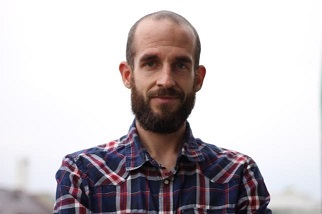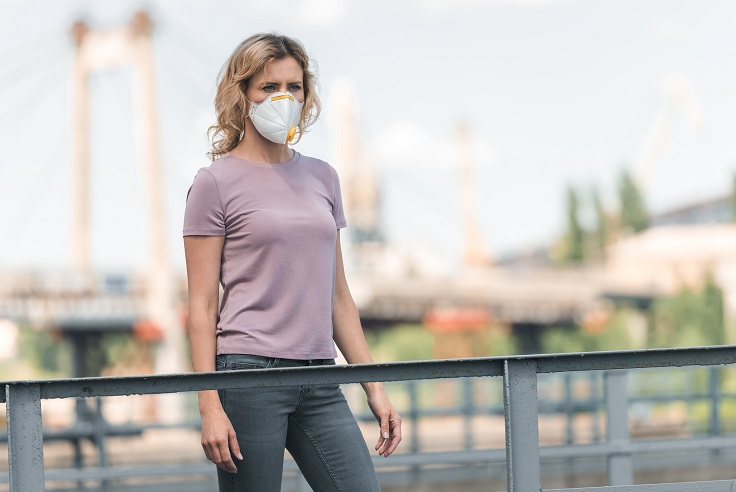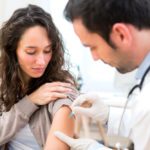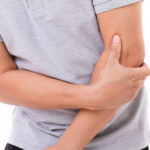The coronavirus SARS-CoV-2 currently dominates the media landscape. Every day new cases occur worldwide and it spreads slowly. But what exactly is the coronavirus and should you be especially careful if you suffer from psoriasis? The most important rule first of all: don’t panic.
What is the Coronavirus?
Coronaviruses are a virus family to which the currently occurring coronavirus also belongs. It is called SARS-CoV-2 and can, but does not have to, cause symptoms.
SARS-CoV-2 can cause a respiratory disease called Covid-19 (coronavirus disease 2019). So, when people with symptoms are mentioned in the media, they carry the SARS-CoV-2 trigger and suffer from the respiratory disease Covid-19.
How is the coronavirus SARS-CoV-2 transmitted?
The coronavirus is mainly transmitted by so-called droplet infection. In this process, pathogens that are located in the throat or respiratory tract get into the air through speaking, sneezing or coughing. These in turn are absorbed by other people.
A droplet infection can also occur when an infected person rubs their nose with their hand, for example, and then shakes your hand. Therefore, it is always advised to wash your hands regularly (for at least 20 seconds and with soap) and to greet each other without physical contact. Coughing or sneezing into the crook of your arm is advised to minimize the risk of droplet infection.
What is the course of SARS-CoV-2 and what are the symptoms?
The coronavirus causes flu-like symptoms such as fatigue, tiredness, fever, cough, and rhinitis. Some people affected have also complained of diarrhea, nausea, headaches and aching limbs, breathing problems, or chills.
It is currently assumed that it can take up to 14 days after infection before symptoms appear. According to the World Health Organization (WHO), the typical time between infection and outbreak is about five to six days.
How dangerous is the virus?
According to initial information from the Robert Koch Institute, four out of five cases show a mild course. For some of those affected, it can also lead to respiratory problems and pneumonia. Some groups of people carry an increased risk of suffering a severe course of the virus disease.
Are there risk groups for coronavirus?
The main risk groups are:
- Persons over 50 years of age: Here the risk increases with age
- People with pre-existing conditions, such as diabetes, respiratory, liver and kidney diseases or cancer. In these cases, there seems to be an increased risk of a severe course of the disease – regardless of age
- patients with suppressed immune systems (e.g. when taking medication). This may also include patients with psoriasis
- Whether there are certain combinations (age and disease) that make severe disease progression more likely has not yet been sufficiently researched.
If you belong to one of the risk groups, you should take special precautions. Try to reduce the risk of transmission by washing your hands regularly and avoiding close contact with people, especially larger groups of people. Obtain information actively and consult your doctor in advance.
Although children get infected with SARS-CoV-2 as quickly as adults, symptoms are rare, so children usually stay healthy and are not at risk. This also applies to pregnant women. However, according to the Robert Koch Institute, it cannot be ruled out that these groups also contribute to the spread of the disease.
What can I do to protect myself from infection?
The most important rule for protection against transmission is to keep your distance. In some places, a distance of at least 1.5 meters is recommended – but try to create more space between you and others. Avoid (close) contact with people who do not live with you, with the exception being significant others. This can also include the family. Group meetings with several people are completely forbidden in most places.
In addition, you should wear a face mask if you can’t guarantee a safe distance. This applies to public transportation and usually also to stores. The protective masks should only be seen as additional protection that you do not infect other people in case of an infection with the coronavirus. Once you have touched the mask with your hands, you should wash or disinfect your hands.
Always follow the basic rules:
- Wash your hands (for at least 20 seconds)
- Keep your distance
- Cough or sneeze in the crook of your arm
The relationship between SARS-CoV-2 and psoriasis:
Do I have an increased risk?
In principle, the risk of infection with the coronavirus is not higher than with other diseases, such as influenza. This also applies to people with psoriasis, who per se do not belong to the coronavirus risk group.
Dr. Ralph von Kiedrowski, dermatologist and psoriasis specialist, also does not assume a fundamentally higher risk for those affected by psoriasis. He says: “In this respect, the same precautionary measures apply to psoriasis patients who are otherwise healthy as to everyone else: hand hygiene, keeping a distance from patients and observing the coughing and sneezing etiquette”.
Should I interrupt my (system) therapy?
Dr. von Kiedrowski further states that he has advised continuing systemic therapy in the past: “With the annual waves of flu in recent years, we have not advised you to do so. He adds: “[F]urther, for patients who have suffered from infections and/or have an additional lung disease more frequently under their immunotherapy, a therapy break may be considered”.
In general, there are some medications for psoriasis that carry an increased risk of infection. It is best to clarify with your doctor whether you should take a break from therapy in some cases. He also recommends getting an influenza and pneumococcal vaccination if you have not already done so.
What should I do if I think I have become infected?
If you notice symptoms or have been in contact with a person who has been diagnosed with SARS-CoV-2, you should contact your doctor immediately. They will let you know what to do next.
It is important to stay at home and clarify the next steps by telephone. If you are taking medication for your psoriasis and there is a suspicion of the coronavirus, you should suspend the medication until the final diagnosis is made.
In all cases: do not panic!
The most important rule is to stay calm and not to panic. This applies both as a precaution and when you notice possible symptoms. In any case, you should be informed and follow the general rules (wash your hands, keep your distance).
Where can I find more information?
Center for Disease Control and Prevention (CDC): https://www.cdc.gov/coronavirus/2019-ncov/index.html
Johns Hopkins Coronavirus Resource Center: https://coronavirus.jhu.edu/
World Health Organization (WHO): https://www.who.int/health-topics/coronavirus/
Frequently asked questions (FAQs)
Do I have an increased risk of infection due to psoriasis?
No. You do not have an increased risk when you suffer from psoriasis.
Do people with psoriasis have an increased risk of suffering a severe course of the disease?
No. Patients with psoriasis have an equally high risk of developing a severe disease course as other patients. If, however, you carry out a systemic therapy that suppresses the immune system, there may be an increased risk of infection. It is best to speak to your doctor directly.
What is the coronavirus?
Coronaviruses are a family of viruses to which the currently occurring coronavirus also belongs. It is called SARS-CoV-2, which can cause a respiratory disease called Covid-19 (coronavirus disease 2019).
What should I do if I feel that I have been infected with corona?
If you do not have any serious symptoms, stay at home and contact your local health authority or a doctor by phone.
Find all sources
Sources:
AG für Biologika und Immuntherapie bei chronisch entzündlichen Hautkrankheiten der ÖGDV, über: http://biologika.oegdv.at/ (accessed on 16.03.2020).
Bundesverband der deutschen Dermatologen (BVDD), über: https://www.bvdd.de/aktuelles-presse/newsroom/hautarztnews/details/news/corona-infektion-selbst-bei-psoriasis-unter-systemtherapie-kein-grund-zur-panik/ (accessed on 09.03.2020).
Bundesministerium für Gesundheit, über: https://www.bundesgesundheitsministerium.de/coronavirus.html (accessed on 10.03.2020).
Paul-Ehrlich-Institut, über: https://www.pei.de/DE/newsroom/dossier/coronavirus/coronavirus-node.html (accessed on 10.03.2020).
Robert Koch Institut, über: https://www.rki.de/DE/Content/InfAZ/N/Neuartiges_Coronavirus/nCoV.html (accessed on 10.03.2020).
Weltgesundheitsorganisation (WHO), über: https://www.who.int/emergencies/diseases/novel-coronavirus-2019/advice-for-public (accessed on 11.03.2020).

Bernd is one of the founders of Simply Psoriasis. He has been suffering from psoriasis for more than 20 years, but sees the chronic skin disease with more composure than a few years ago (which was a hard work). Nevertheless, he is very keen to make psoriasis easier and more socially accepted.









Last Comments